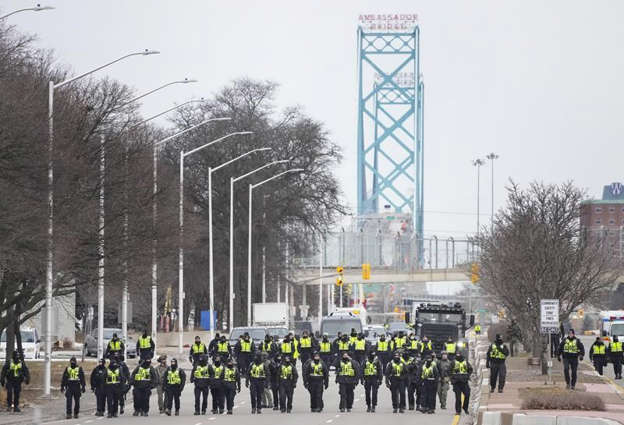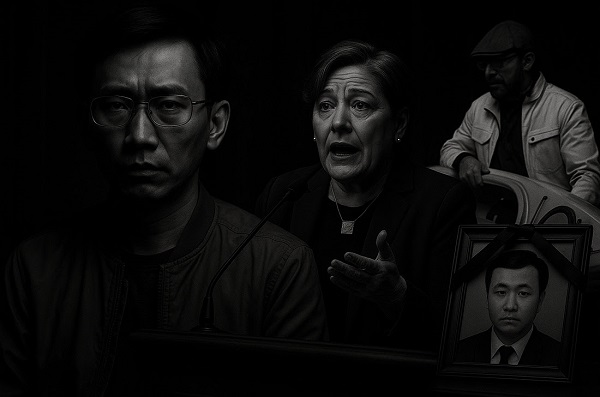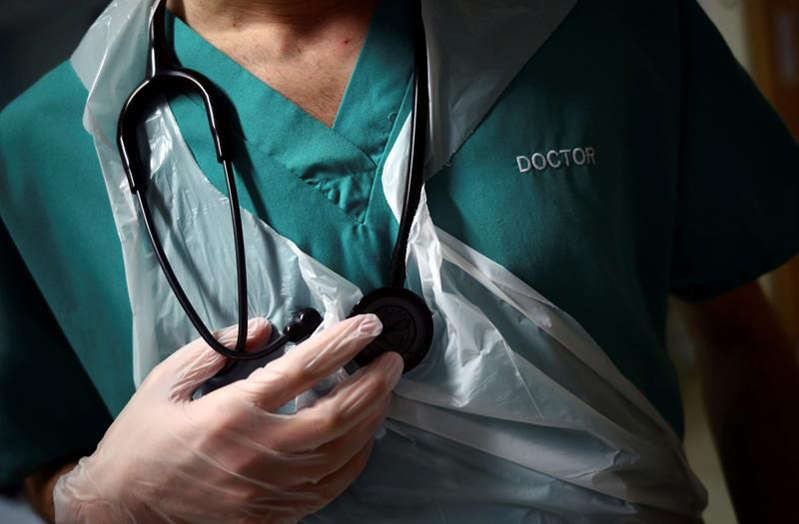COVID-19
Police clear out border blockade as Ottawa seeks deal with convoy to start rolling

Protesters decrying COVID-19 restrictions and the federal government itself were moved from the mouth of a crucial trade route with the United States on Sunday, while confusion reigned over whether a group stationed in Ottawa would reduce their footprint in the capital’s core.
Officers in Windsor, Ont., arrested some two dozen protesters and moved others from the busy Ambassador Bridge spanning the Detroit River, towing five vehicles on Sunday at the site where protesters brought traffic to a halt for nearly a week and barring others from arriving on scene.
Windsor Police Chief Pamela Mizuno said officers are working to reopen roadways, but did not provide a timeline as to when that would occur. The reopening would allow the resumption of hundreds of millions of dollars in daily cross-border trade between Canada and the United States.
But despite the show of force as a line of officers marched on demonstrators who had clogged traffic on the key trade corridor, protesters opposed to COVID-19 restrictions and the government of Prime Minister Justin Trudeau continued to wave Canadian flags and holler the word “freedom,” with one shouting into a megaphone, “This is a peaceful protest.”
Wearing a Canadian flag around her shoulders, Windsor resident Karen Parrinello said she’s been coming out to demonstrate since Thursday evening and plans to be there for the long haul.
“As long as it takes, I’ll keep coming back. I can’t stay here all day, but I’ll come back here a couple hours a time every day until it’s better, until all the mandates are gone and we have our freedoms back,” she said.
Police in Windsor had negotiated with protesters over the weekend to get them to leave, warning of arrests if they kept bridge traffic at a standstill.
Police said between 25 and 30 people were arrested, many of whom are now facing mischief charges. Mizuno said roughly a dozen vehicles were also seized or towed over the weekend.
“There are steps we need to take in order to open the roadways so that we don’t encounter the same issues,” she said at an afternoon news conference. “Please note we are moving as fast as we can, however, we need to make sure this is a safe and sustainable solution.”
While Windsor Mayor Drew Dilkens expressed his thanks to police, he issued a similar statement to residents of his border city who “respected the process needed to find a resolution.”
“Canada is a nation that believes in the right to freedom of speech and expression, but we are also bound by the rule of law,” Dilkens said in a statement.
Hours later, his counterpart in Ottawa, Mayor Jim Watson, released letters he said were between himself and organizers of the so-called Freedom Convoy about a deal to move some of the 400 vehicles encamped downtown to Parliament Hill and away from residential neighbourhoods.
The correspondence between the two sides suggested convoy organizers agreed to start moving trucks to Wellington Street, which runs in front of Parliament Hill, as well as a host of parliamentary buildings including the Prime Minister’s Office. Those moves, according to the letter, will get underway Monday.
If moves happen before the noon deadline Watson set in his letter, Ottawa’s mayor agreed to meet with the protesters who, on Sunday, turned intersections once busy with traffic into dance floors with loudspeakers and draped themselves in the Canadian flag as they wandered downtown streets amid idling vehicles and semis.
In a note to city councillors, Watson’s office said any movement of trucks wouldn’t be “a long-term solution to the occupation,” but a step to reduce the impact on those who live in the area.
On Sunday night, convoy board president Tamara Lich tweeted that plans to relocate trucks would go ahead on Monday, posting the note hours after denying any deal and vowing to stay downtown until federal vaccine mandates are eliminated.
Residents who have become frustrated with a lack of movement on the situation joined with a local city councillor and provincial politician to block a convoy on its way to join up with demonstrators downtown.
Sean Burgess said the spontaneous counter-protest, organized late Saturday evening, should be a clear signal to federal, provincial and local leaders about ending what even Watson has described as an illegal occupation of the capital’s core.
“Ottawa is not the dull city all of Canada thinks, but it’s certainly not a city of people who get out in the street and become activists, particularly spontaneously,” Burgess said by the line of counter-protesters.
“So when you see people in a neighborhood like Old Ottawa South, who would rather complain, and litigate, so to speak, rather than take direct action on the streets, standing in front of trucks saying to the cops, ‘fine, arrest me,’ then you know that something has gone really too far.”
In a statement, Ontario Premier Doug Ford called anew on protesters in Ottawa to leave, while praising the Windsor police, Ontario Provincial Police and RCMP officers who worked to reopen the Ambassador Bridge.
The developments in Ontario came as protests continued around the country in support of the convoys that set up camp in Ottawa.
Police contended with demonstrations at other border crossings, including in British Columbia where four people were arrested near the border crossing in Surrey. That crossing remained open as of Sunday, the Canada Border Services Agency said.
The ongoing protests spurred Trudeau to meet with senior officials and cabinet members. He said in a late night tweet that his “incident response group” covered further actions the federal government can take.
“We’ll keep working urgently on this – to protect jobs, public safety, our neighbourhoods, and our economy,” the tweet said.
Trudeau was also to invite premiers to a meeting Monday about the protests, according to a government source, who was not authorized to speak publicly about the matter.
This report by The Canadian Press was first published Feb. 13, 2022.
– With files from Justin Tang and Marie Woolf in Ottawa, and Brieanna Charlebois in Vancouver.
Noushin Ziafati and Jordan Press, The Canadian Press
COVID-19
Canadian Health Department funds study to determine effects of COVID lockdowns on children

From LifeSiteNews
The commissioned study will assess the impact on kids’ mental well-being of COVID lockdowns and ‘remote’ school classes that banned outdoor play and in-person learning.
Canada’s Department of Health has commissioned research to study the impact of outdoor play on kids’ mental well-being in light of COVID lockdowns and “remote” school classes that, for a time, banned outdoor play and in-person learning throughout most of the nation.
In a notice to consultants titled “Systematic Literature Reviews And Meta Analyses Supporting Two Projects On Children’s Health And Covid-19,” the Department of Health admitted that “Exposure to green space has been consistently associated with protective effects on children’s physical and mental health.”
A final report, which is due in 2026, will provide “Health Canada with a comprehensive assessment of current evidence, identify key knowledge gaps and inform surveillance and policy planning for future pandemics and other public health emergencies.”
Bruce Squires, president of McMaster Children’s Hospital of Hamilton, Ontario, noted in 2022 that “Canada’s children and youth have borne the brunt” of COVID lockdowns.
From about March 2020 to mid-2022, most of Canada was under various COVID-19 mandates and lockdowns, including mask mandates, at the local, provincial, and federal levels. Schools were shut down, parks were closed, and most kids’ sports were cancelled.
Mandatory facemask polices were common in Canada and all over the world for years during the COVID crisis despite over 170 studies showing they were not effective in stopping the spread of COVID and were, in fact, harmful, especially to children.
In October 2021, then-Prime Minister Justin Trudeau announced unprecedented COVID-19 jab mandates for all federal workers and those in the transportation sector, saying the un-jabbed would no longer be able to travel by air, boat, or train, both domestically and internationally.
As reported by LifeSiteNews, a new report released by the Justice Centre for Constitutional Freedoms (JCCF) raised alarm bells over the “harms caused” by COVID-19 lockdowns and injections imposed by various levels of government as well as a rise in unexplained deaths and bloated COVID-19 death statistics.
Indeed, a recent study showed that COVID masking policies left children less able to differentiate people’s emotions behind facial expressions.
COVID vaccine mandates and lockdowns, which came from provincial governments with the support of the federal government, split Canadian society.
COVID-19
Ontario student appeals ruling that dismissed religious objection to abortion-tainted COVID shot

From LifeSiteNews
An Ontario Tech University student is seeking judicial review after the Human Rights Tribunal of Ontario ruled his beliefs did not qualify as protected ‘creed.’
An Ontario university student who was punished for refusing the COVID shot is contesting a tribunal ruling that rejected his religious objection to the vaccine.
In a November 28 press release, the Justice Centre for Constitutional Freedoms (JCCF) announced that a judicial review has been filed on behalf of former Ontario Tech University student Philip Anisimov after his religious objection to the COVID vaccine was dismissed by an Ontario court.
“Mr. Anisimov’s objection to the Covid vaccine was deeply rooted in his religious commitment to live according to biblical precepts,” Constitutional lawyer Hatim Kheir declared. “He hopes the Divisional Court will clarify that his religious objection was protected by the Human Rights Code and entitled to protection.”
In 2021, Ontario mandated that all students in the province show proof of vaccination unless they had an exemption or agreed to attend a COVID jab education session boasting about the shots. The third option was not available at Ontario Tech University, as schools could choose whether or not they would offer such a program to students.
Anisimov had requested an exemption from the experimental, abortion-tainted COVID shots on religious grounds but was denied and deregistered from his courses.
He was then forced to spend an entire extra year to complete his studies. According to his lawyers, Ontario Tech University’s decision to not approve his COVID jab exemption request “not only disrupted his career plans but also violated his right to be free from discrimination on the basis of religion, as protected by the Ontario Human Rights Code.”
The university’s refusal to honor his exemption prompted Anisimov to take legal action in April with help of the JCCF. However, the Human Rights Tribunal of Ontario rejected his religious objection, arguing that it was not protected as a “creed” under the Ontario Human Rights Code.
Now, Anisimov is appealing the ruling, hoping that his case will serve as a precedent for justice for students who were discriminated against for refusing the abortion-tainted vaccine.
“My hope is that this case helps set an important precedent and encourages Canadians to reflect on the direction our society is taking,” he explained. “My trust is that God does all things for the good of those who love Him, who are called by His purposes.”
COVID vaccine mandates, as well as lockdowns that came from provincial governments with the support of the federal government, split Canadian society. The mRNA shots have been linked to a multitude of negative and often severe side effects in children.
Beyond health concerns, many Canadians, especially Catholics, opposed the vaccines on moral grounds because of their link to fetal cell lines derived from the tissue of aborted babies.
-

 Bruce Dowbiggin2 days ago
Bruce Dowbiggin2 days agoIntegration Or Indignation: Whose Strategy Worked Best Against Trump?
-

 International2 days ago
International2 days agoFBI may have finally nabbed the Jan. 6 pipe bomber
-

 Business2 days ago
Business2 days agoCarney’s Toronto cabinet meetings cost $530,000
-

 espionage2 days ago
espionage2 days agoDigital messages reportedly allege Chinese police targeted dissident who died suspiciously near Vancouver
-

 MAiD2 days ago
MAiD2 days ago101-year-old woman chooses assisted suicide — press treats her death as a social good
-

 COVID-191 day ago
COVID-191 day agoUniversity of Colorado will pay $10 million to staff, students for trying to force them to take COVID shots
-

 Business1 day ago
Business1 day agoOil tanker traffic surges but spills stay at zero after Trans Mountain Expansion
-

 Censorship Industrial Complex2 days ago
Censorship Industrial Complex2 days agoJustice Centre campaigning Canadian provinces to follow Alberta’s lead protecting professionals






